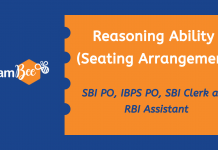As the curtain rises on the RBI Grade B notification for 2024, the atmosphere is charged with eager anticipation. The prestigious nature of this examination, coupled with its attractive perks and incentives, has rendered the RBI Grade B post a coveted aspiration for a diverse spectrum of candidates – from recent graduates to seasoned professionals.
Despite the allure of this sought-after position, the relatively new status of the exam has left it somewhat in the shadows within the competitive exam landscape. This lack of familiarity has paved the way for the proliferation of myths and misconceptions circulating through the internet and social media. Unfortunately, these unverified claims have the potential to cast doubt on the ambitions of prospective RBI Grade B Officers.
In light of this scenario, it becomes imperative for aspirants to dispel these myths and acquire a nuanced understanding of the exam’s intricacies before embarking on their preparation journey. This blog talks more about some of the common dos and don’ts for the RBI Grade B Exam, providing aspiring candidates with the tools to prepare for the exam efficiently. As candidates often grapple with uncertainties surrounding this highly sought-after examination, this blog seeks to empower them with accurate information and insights, ensuring they approach their preparation with an explicit and informed mindset.

Achieving success in the RBI Grade B exam demands mastery of the syllabus and adept navigation through the wealth of information available. In the current competitive exams’ rising popularity landscape, misinformation abounds, sowing seeds of confusion. The forthcoming paragraphs will unravel specific myths surrounding the RBI Grade B exam. By dispelling these misconceptions and shedding light on the true nature of the examination, this blog aims to guide aspirants towards a focused and effective preparation strategy. Let’s unravel the realities behind the myths and equip candidates with the knowledge needed to pursue success in the RBI Grade B examination.
RBI Grade B Exam Eligibility Criteria
A solid understanding of the qualifying requirements is necessary to pass the RBI Grade B 2024 exam. Although the official RBI Grade B Eligibility Criteria for 2024 are not yet available, the information gained from the 2023 notice is quite helpful. A bachelor’s degree is a prerequisite that cannot be waived, and applicants must fall between the ages of 21 and 30, with certain age exceptions for designated groups. Examining the RBI Grade B eligibility requirements in detail forms the cornerstone of a strategic preparation plan and acts as a compass for self-evaluation.
It is essential that you be alert for the RBI Grade B Notification. This proactive approach guarantees access to accurate and current information necessary for a smooth application procedure for the RBI Grade B exam. To meet qualifying requirements and successfully navigate the difficulties of the RBI Grade B test, prospective candidates must stay informed about any changes to the criteria.
| Criteria | Specifications |
| Educational Criteria | Graduation in any discipline /Equivalent technical or professional qualification with minimum 60% marks (50% for SC/ST/PwBD applicants) |
| Age Criteria | Minimum-21 Years / Maximum-30 Years |
| Age Relaxation | Minimum-3 Years / Maximum-13 Years |
RBI Grade B Exam Pattern
Get ready for the upcoming RBI Grade B 2024 exam by familiarizing yourself with the nuances included in the prior year’s announcement. Knowing the RBI Grade B Exam Pattern and Syllabus is essential to your preparation as it guides the creation of a well-planned plan. Phase 1 (Prelims) lasts two hours, is bilingual, objective, and is worth 200 marks. Phase 2 (Mains) comprises three papers, each with a different duration: Paper 1 is objective and descriptive (100 points), Paper 2 focuses on writing abilities (100 marks), and Paper 3 is also objective and descriptive (100 marks). Part 3, or the interview, is the final part worth 75 marks. This thorough understanding of the test format enables candidates to develop a targeted and effective study plan.
Pay close attention as you prepare for the RBI Grade B Exam. There is likely a wealth of important information that could affect how you prepare. Keep an eye out for any modifications, and make sure your strategy adapts to the RBI Grade B Exam’s changing criteria. This increased awareness of notification specifics improves your preparedness and gives you an edge over other candidates when tackling the RBI Grade B exam’s problems. A quick overview of the exam pattern is provided in the table below.
| Phases | Exam Type | Marks | Duration | Exam Language |
| Phase 1 (Prelims) | Objective | 200 marks | 2 hours | Bilingual (Except the test for English language.) |
| Phase 2 (Mains) | Paper 1 (Objective & Descriptive) | 100 marks | 30 minutes (Objective) & 1 hour 30 minutes (Descriptive) | |
| Paper 2 (Writing Skills) | 100 marks | 1 hour 30 minutes | ||
| Paper 3 (Objective & Descriptive) | 100 marks | Composite time of 2 hours | ||
| Phase 3 (Interview) | Interview | 75 marks | ||
In preparation for the upcoming RBI Grade B Exam 2024, aspirants should channel their efforts towards mastering four crucial subjects: General Awareness, English Language, Reasoning, and Numerical Ability. A thorough understanding of the entire RBI Grade B exam syllabus for Phase 1 is indispensable for achieving success. General awareness, a pivotal component, can be effectively covered using BeePedia, a General Awareness platform for exams conducted by regulatory bodies and Bank Exams.
The Mains phase is quite significant for candidates surpassing the predetermined Prelims cut-off. The selective approach ensures that only the most qualified individuals progress to the Mains phase. The Mains Exam pattern encompasses three papers: Economics and Social Issues, Descriptive English, and Finance Management. This multifaceted evaluation process incorporates objective and descriptive components, providing depth and breadth to the assessment criteria. Aspirants must navigate this comprehensive structure to secure success in the RBI Grade B examination and progress toward the coveted position in the banking sector. For a detailed understanding of the topics to focus on, refer to the RBI Grade B Exam Syllabus 2024 outlined in the table below.
| RBI Grade B Prelims Syllabus | |
| Subject | Topics |
| Quantitative Aptitude | Simplification and approximation, Number Series, Quadratic Equation, Number System / HCF & LCM, Ratio and Proportion, Average, Partnership, Ages, Percentage, Profit & Loss, Time, Speed & Distance, Problems on Trains, Boat and Stream, Time & Work / Pipes and Cisterns, Simple and Compound Interest, Mixture & Allegations, Permutation and Combination, Probability, Data Interpretation (DI), Caselet DI and Data Sufficiency |
| English | Grammar, Vocabulary, Reading Comprehension, Passage Making, Error Spotting, Jumble Words, Sentence Framing, Fill in the blanks |
| General Awareness | Monetary Policies, Banking and Financial Awareness, Economic Terms, Current Affairs (BeePedia), Static GK, Financial and Economic News, Government Schemes. Agreement & Deals, Banking Terms- rates & processes, National Institutions |
| Reasoning | Puzzles, Seating Arrangement- Circular, Square & Linear, Data Sufficiency, Directions and Distance, Coding-Decoding, Blood relations, Inequality, Syllogism, Machine input and output, Verbal Reasoning, Ordering and Ranking, Arrangement and Pattern, Scheduling, Distance and Direction, Ranking |
| RBI Grade B Economic and Social Issues (ESI) Syllabus | |
| Topics | Sub-Topics |
| Growth and Development | Measurement of growth: National Income and per capita income – Poverty Alleviation and Employment Generation in India – Sustainable Development and Environmental issues. |
| Indian Economy | Economic History of India – Changes in Industrial and Labour Policy, Monetary and Fiscal Policy since reforms of 1991 – Priorities and recommendations of Economic Survey and Union Budget – Indian Money and Financial Markets: Linkages with the economy – Role of Indian banks and Reserve Bank in the development process – Public Finance – Political Economy – Industrial Developments in India- Indian Agriculture – Services sector in India. |
| Globalization | Opening up of the Indian Economy – Balance of Payments, Export-Import Policy – International Economic Institutions – IMF and World Bank – WTO – Regional Economic Cooperation; International Economic Issues. |
| Social Structure in India | Multiculturalism – Demographic Trends – Urbanisation and Migration – Gender Issues – Social Justice. |
Common Do’s & Don’ts for the RBI Grade B Exam
Applying common sense and avoiding frequent pitfalls are essential for successfully navigating the RBI Grade B Exam. This segment offers the much-needed information to help prepare for the exam effortlessly. Knowing what to focus on and what to avoid will help you create a targeted study schedule that will enable you to meet the demands of the RBI Grade B Exam with accuracy and confidence. Let’s look at common Do’s and Don’ts for the RBI Grade B Exam.
Dos
- Mock Exam Essentials: As part of your preparation strategy, practice carrying the necessary documents and utilizing a transparent pen during mock exams to recreate the real exam scenario. Simulating these conditions enhances your familiarity and readiness for the actual examination. Additionally, consider leveraging the RBI Grade B Free Mock Tests provided by ixamBee, a valuable resource to refine your exam-taking skills further and assess your preparedness under simulated conditions. These mock tests offer a comprehensive platform to fine-tune your strategy and boost your confidence for the RBI Grade B Exam.
- Strategic Revision Planning: Craft a meticulous revision strategy by allocating focused time to each subject, ensuring a thorough review of the entire RBI Grade B exam syllabus. Prioritize key concepts and address weak areas systematically. Consider leveraging ixamBee’s RBI Grade B Online Course, a comprehensive resource to enhance your preparation. With expert guidance, mock tests, and interactive learning modules, this course provides a structured approach to revision, significantly boosting your confidence and readiness for the RBI Grade B exam.
- Study Plan Execution: Execute a robust revision plan by breaking down RBI Grade B exam topics into manageable sections, ensuring a thorough review. Create a structured study plan that incorporates regular breaks to optimize information retention. This approach not only prevents burnout but also enhances focus during study sessions. Balancing concentrated study periods with breaks fosters effective learning, making the revision process more efficient and increasing your overall readiness for the RBI Grade B examination.
- Leverage Previous Year Papers: Elevate your preparation by actively engaging with ixamBee’s RBI Grade B Previous Year Papers. This practice allows you to discern recurring patterns, understand the exam format, and familiarize yourself with the types of questions frequently asked. Analyzing these papers aids in identifying key topics, refining time-management skills, and gaining insights into the examination’s nuances. Incorporating this strategy fortifies your knowledge and instills confidence, positioning you strategically for success in the RBI Grade B examination.
- Short Notes Recall: Strengthen your grasp of crucial concepts by revisiting and recalling information from your concise study notes. This process reinforces your understanding and consolidates information, facilitating swift retrieval during the RBI Grade B examination. Regularly revisiting short notes not only aids in solidifying knowledge but also enhances your ability to recall vital details, empowering you to navigate the exam with confidence and efficiency. This focused revision approach ensures that essential information is at your fingertips, contributing to a more successful RBI Grade B examination performance.
- Final Round Revisions: Focus on reviewing materials consolidates your knowledge base, reinforces critical concepts, and instills a heightened confidence level. As the exam date approaches, these targeted revisions serve as a crucial mechanism for refining your understanding and ensuring that you enter the RBI Grade B examination with a thorough and well-consolidated command of the syllabus, thereby maximizing your chances of success.
- Stay Informed with News: Keep a record of pivotal details concerning the RBI that have surfaced in recent news, guaranteeing your awareness of current affairs potentially relevant to the exam. This proactive approach keeps you informed about the latest developments and ensures that you are well-prepared to tackle questions that may draw upon contemporary events. Integrating current affairs into your preparation strategy contributes to a comprehensive understanding of the subject matter, enhancing your readiness for the RBI Grade B exam and positioning you for success.
- Positive Mindset Approach: Cultivate a positive mindset as you approach questions during the exam, fostering confidence and composure to navigate challenges with clarity and focus. Maintaining a constructive outlook enhances problem-solving abilities and aids in overcoming any test-related stress. A positive mindset bolsters your mental resilience and contributes to a more effective and composed performance, ensuring you can tackle the RBI Grade B exam with confidence and poise, even in the face of challenging questions.
Don’ts
- Strategic Preparation: Initiate your exam preparation with a well-defined strategy. Develop a roadmap that outlines study schedules, efficient resource utilization, and milestone targets. This strategic approach ensures organized and effective RBI Grade B exam preparation. By establishing clear objectives and a structured plan, you optimize your study sessions, fostering a focused and purposeful journey toward success in the upcoming examination.
- Syllabus and Question Papers Analysis: Mitigate carelessness by meticulously referring to the syllabus and analyzing last year’s question papers. Understanding the exam pattern and key topics becomes crucial, facilitating targeted and focused preparation. This diligent approach aligns your efforts with the exam’s specific requirements, ensuring that your study plan is tailored to the nuances of the RBI Grade B examination and you are well-prepared for the challenges it presents.
- Section-wise Time Allocation: Ensure optimal preparation by allocating dedicated time for section-wise revision. This strategic practice prevents oversight or neglect of any specific subject, enhancing your overall readiness for the RBI Grade B exam. By adopting a structured approach to revision, you optimize your understanding of each exam section, fortifying your grasp on key concepts and significantly improving your performance across all subjects. This intentional time allocation ensures a comprehensive and well-balanced preparation, positioning you for success in the forthcoming examination.
- Preparation of Short Notes: Don’t underestimate the significance of creating short notes on critical topics. These condensed summaries are invaluable quick references, streamlining your revision process and aiding memory recall during the RBI Grade B exam. By compiling key insights and concepts into brief notes, you not only facilitate efficient revision but also enhance your ability to retrieve essential information swiftly during the examination, contributing to a more confident and effective performance. Prioritize creating and utilizing short notes as an integral part of your exam preparation strategy.
- Covering Financial News: Avoid overlooking the importance of staying updated on financial news and developments, as they play a crucial role in the RBI Grade B exam. Prioritize staying informed about current financial affairs to answer questions about economic aspects accurately. By remaining abreast of the latest financial updates, you enhance your overall knowledge and ensure you are well-equipped to tackle questions that may draw upon contemporary financial scenarios in the examination. This proactive approach contributes to a comprehensive and well-rounded RBI Grade B exam preparation.
- Avoid Last-minute Exhaustion: Avoid exhaustive study and revision one day before the exam. Instead, prioritize rest and relaxation to ensure a fresh and focused mind on the exam day, minimizing the risk of burnout and fatigue. Adequate rest enhances cognitive function and alertness, allowing you to approach the RBI Grade B exam with a clear and energized mindset. This intentional break from intense preparation fosters a balanced approach, optimizing your performance and promoting a more composed and confident demeanor during the examination.
Summing Up
Success in the RBI Grade B exam demands a strategic and informed approach. By dispelling myths, understanding eligibility criteria, and adopting effective dos and don’ts, aspirants can navigate the exam landscape confidently. Leveraging resources like ixamBee’s RBI Grade B Online Course and Free Mock Tests enhance preparedness. As the curtain rises on the 2024 notification, a focused and well-structured preparation strategy, coupled with a positive mindset, positions candidates for success in their pursuit of the coveted RBI Grade B post
To help you prepare 50% faster for competitive exams, ixamBee provides a free Mock Test Series and all the Current Affairs in English and Current Affairs in Hindi in the BeePedia capsules for GA Preparation. You can also get the latest updates for Bank PO, Bank Clerk, SSC, RBI Grade B, NABARD, and Other Government Jobs.
Also Read
Everything to Know About the SSC CPO Exam
Most Important GD topics for SBI PO 2023-24
5 Biggest Ongoing Exams of Jan 2024 for Graduates















